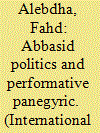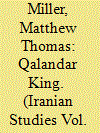| Srl | Item |
| 1 |
ID:
178033


|
|
|
|
|
| Summary/Abstract |
The poet ʿAli ibn Jabala, also called al-ʿAkawwak, was a little known but significant poet who lived during the late 8th and early 9th centuries. This article examines his poetry in its political and cultural context to delineate the literary devices exploited by the poet in his poems of praise. Moreover, this paper interprets existing prose anecdotes claiming that al-ʿAkawwak's panegyric poem to the caliph al-Maʾmun's commander, Abu Dulaf al-ʿIjli, made the caliph so furious that he ordered the poet's execution, despite the poet having never composed any verses overtly criticizing the caliph. The argument is made that, within the tense political atmosphere of the time, the style that the poet embraced in praising the two commanders, Abu Dulaf al-ʿIjli and Humayd al-Tusi, intensified al-Maʾmun's anger toward the poet.
|
|
|
|
|
|
|
|
|
|
|
|
|
|
|
|
| 2 |
ID:
184814


|
|
|
|
|
| Summary/Abstract |
Historical treatments of the “rogue lyrics” (qalandariyyāt) of medieval Persian poetry typically identify their origin in the Sufi poetry of Bābā Tāher, Abu Saʿid, and Sanāʾi and portray them as a poetic instantiation of the intellectual and antinomian critiques of the formalistic modes of piety practiced in the increasingly powerful institutionalized Sufi orders. However, the qalandari panegyrics of the Saljuq court poets Borhāni and Amir Moʿezzi—arguably the earliest datable examples of this poetry—analyzed in this article complicate this narrative. They utilize the heterotopic poetics of the qalandariyyāt not to subvert or critique, but rather to augment the sociopolitical authority of the ruler of Qazvin, constructing a new and distinctly Saljuq model of Islamic kingship, a Qalandar King.
|
|
|
|
|
|
|
|
|
|
|
|
|
|
|
|